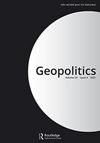Beyond Haushoferism: Geography, Geopolitics and National Socialist Rule at Munich’s Ludwig Maximilian University
IF 3.4
1区 社会学
Q1 GEOGRAPHY
引用次数: 1
Abstract
ABSTRACT For decades, German geographers’ entanglement with Nazi rule has been described as primarily related to geopolitics and, more specifically, to the figure of Karl Haushofer – the ‘black sheep’ of an otherwise ‘scientific’ discipline. While research has been dismantling this ‘Haushoferism’ since the 1980s, the academic geography environment in which Haushofer was embedded in Munich has not been studied thus far. The present article seeks to fill this lacuna. In doing so, it aims to enhance our understanding of the relationship between geography, geopolitics, and Nazi rule. Through a biographical analysis, we investigate the work of three key geography scholars at Munich’s Ludwig Maximilian University (LMU): the two consecutive chairholders in geography (Erich von Drygalski [1906–1935] and Fritz Machatschek [1935–1946]) and Haushofer’s closest academic disciple (Gustav Fochler-Hauke). Building on archival research, complemented by an analysis of these geographers’ writings, we focus on 1) the relationship between geographical and geopolitical thought development at LMU and 2) the entanglement of Fochler-Hauke and Machatschek with Nazi rule. Our analysis shows that geographical and geopolitical thought were inextricably linked. Whereas much research has focused on (Haushofer and) the development of geopolitics, geographers’ increasing transformation into Kämpfende Wissenschaftler [fighting scholars] has been neglected. This applied, practical-political orientation of geography, which aimed to sustain and support the expansionary National Socialist project, characterised the development of the discipline at LMU during the Nazi period.超越豪斯霍夫主义:慕尼黑路德维希·马克西米利安大学的地理学、地缘政治和国家社会主义统治
摘要几十年来,德国地理学家与纳粹统治的纠缠一直被描述为主要与地缘政治有关,更具体地说,与卡尔·豪斯霍费尔(Karl Haushofer)这一“科学”学科的“害群之马”有关。尽管自20世纪80年代以来,研究一直在瓦解这种“豪斯霍费尔主义”,但迄今为止,豪斯霍费尔在慕尼黑所处的学术地理环境尚未得到研究。本条试图填补这一空白。通过这样做,它旨在增强我们对地理、地缘政治和纳粹统治之间关系的理解。通过传记分析,我们调查了慕尼黑路德维希·马克西米利安大学(LMU)三位关键地理学者的工作:两位连续担任地理学主席的人(Erich von Drygalski[1906–1935]和Fritz Machatschek[1935–1946])和豪斯霍费尔最亲密的学术弟子(Gustav Fochler Hauke)。在档案研究的基础上,辅以对这些地理学家著作的分析,我们重点关注1)LMU地理和地缘政治思想发展之间的关系,以及2)福克勒·豪克和马查切克与纳粹统治的纠缠。我们的分析表明,地理和地缘政治思想密不可分。尽管许多研究都集中在(Haushofer和)地缘政治的发展上,但地理学家越来越多地转变为Kämpfende Wissenschaftler(战斗学者)却被忽视了。这种实用的地理政治取向旨在维持和支持扩张性的国家社会主义项目,是纳粹时期LMU学科发展的特点。
本文章由计算机程序翻译,如有差异,请以英文原文为准。
求助全文
约1分钟内获得全文
求助全文
来源期刊

Geopolitics
Multiple-
CiteScore
7.60
自引率
10.30%
发文量
50
期刊介绍:
The study of geopolitics has undergone a major renaissance during the past decade. Addressing a gap in the published periodical literature, this journal seeks to explore the theoretical implications of contemporary geopolitics and geopolitical change with particular reference to territorial problems and issues of state sovereignty . Multidisciplinary in its scope, Geopolitics includes all aspects of the social sciences with particular emphasis on political geography, international relations, the territorial aspects of political science and international law. The journal seeks to maintain a healthy balance between systemic and regional analysis.
 求助内容:
求助内容: 应助结果提醒方式:
应助结果提醒方式:


